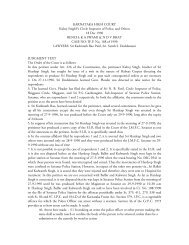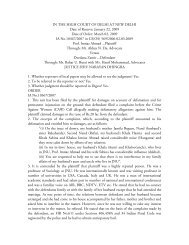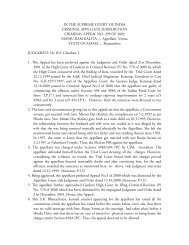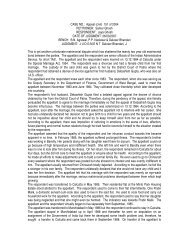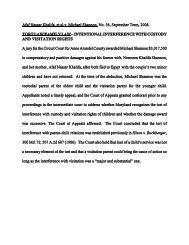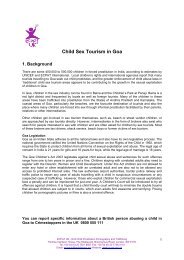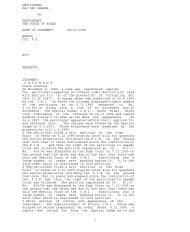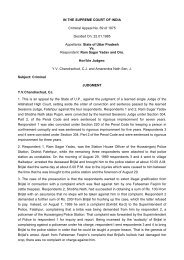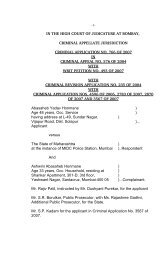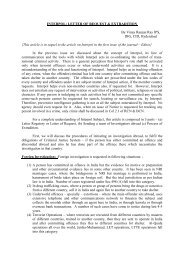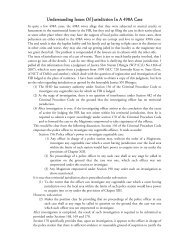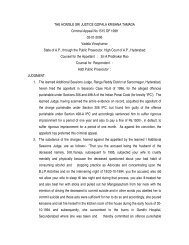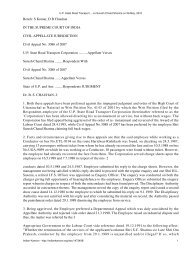THE HINDU MARRIAGE ACT, 1955 - IPC 498A
THE HINDU MARRIAGE ACT, 1955 - IPC 498A
THE HINDU MARRIAGE ACT, 1955 - IPC 498A
You also want an ePaper? Increase the reach of your titles
YUMPU automatically turns print PDFs into web optimized ePapers that Google loves.
268 International and Comparative 1,ax Quarterly [VOL. 6presented, in the case of pre-Act marriages, within one year of thecommencement of the Act, and in the case of post-Act marriagewithin one year of the marriage and that matrimonial intercoursehas not taken place, with the consent of the petitioner, since thediscovery of the respondent's pregnancy; or if the consent of aspouse or her legal guardian was obtained by fraud or force: onthis ground a marriage cannot be declared a nullity if the petitionwas presented after the expiry of one year from the date of thediscovery of fraud or of ceasing of the force, and also if thepetitioner with his or her free consent continued to live with therespondent as husband or wife, as the case may be, after thediscovery of fraud or of ceasing of the force.'The English law of nullity is very unsatisfa~tory.~ The framersof the Hindu Marriage Act have tried to mitigate the harshnessof the English law of nullity though in doing so they have alsoattempted certain innovations with curious results.The Act provides that no marriage solemnised either before orafter the commencement of the Act and whether such marriage isvoid or voidable shall be deemed to have been lawfully dissolvedunless a decree to that effect has been pronounced by a competentcourt.'The novel feature of the Act in respect to the nullity of marriageis that it lays down that a petition for nullity of marriage can bepresented only by either of the parties to the marriage: if theparties choose not to present such a petition, the marriage shallremain in force, whatever it be.8 The curious inference from thisprovision is that a marriage performed in violation of any or allthe conditions specified in section 5 of the Act, will continue tobe in force if both the parties choose to live together. To someextent it can even challenge the penal provision of bigamy, sincebigamy under the Indian law is not a cognisable offence "ndsince under the Indian Law a complaint can be lodged only bya party aggrieved by the marriage.''5 s. 18 of the Act. 6 Th~s fact 1s non accepted by Engl~sh arlters and they favour ~ts reform 7 That is the effect of ss. 11 and 12 of the Act. 8 S. 11 of the Act. 9.198 of the Criminal Procedure Code.10 Under s. 198 of the Criminal Procedure Code a complaint can he lodged only byan aggrieved party. Thus, the brother of a lunatic husband (vide BaiRukshmoni's case, I.L.R. (1886) 10 Bom. 340), the brother of a secondhusband (bigamous), (vide I.L.R. (1902) 25 All. 132), t,he father of the firsthusband (vide I.L.R. (1909) 32 All. 78) cannot lodge a complaint: However,the effect of these cases has now been mitigated by adding a proviso to thesect,ion which runs, " Provided that, where the person so aggrieved is a womanwho, according t,o the customs and manners of the country, ought not to becompelled to appear in public or where such person is under t,he age of eighteenyears or is an idiot or lunatic, or is from sickness or infirmity unable to make



